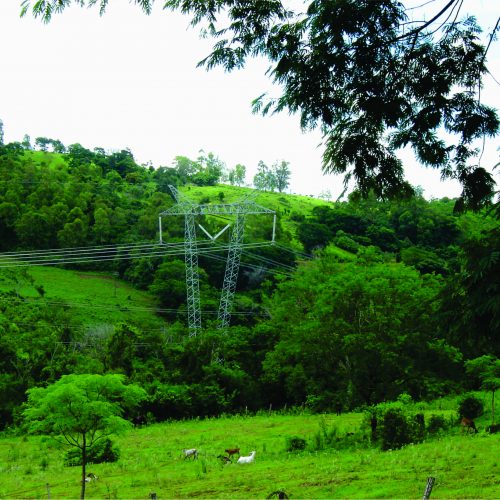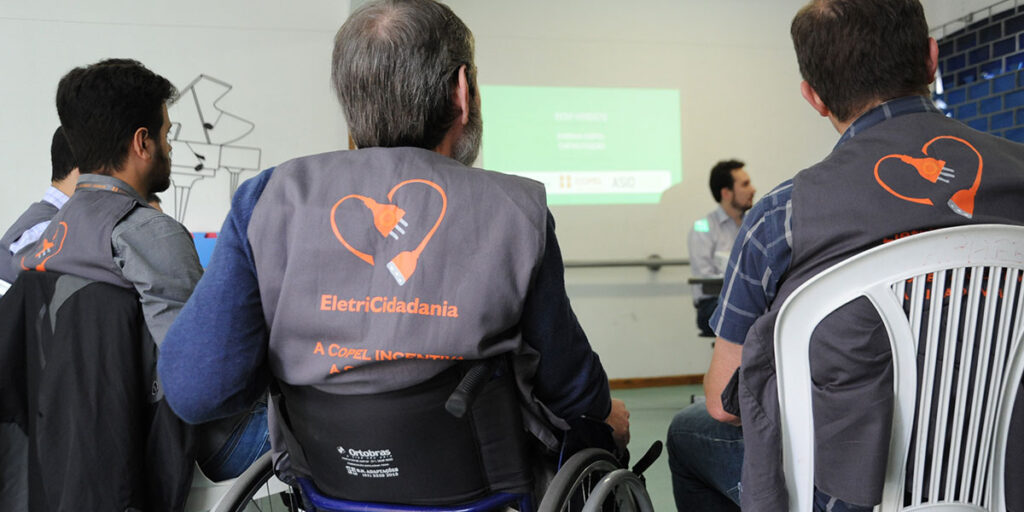Impacts
Copel’s practices, actions and commitments reflect its focus on sustainable development and are aligned with strategic guidelines, mission, vision and corporate values.
Such practices are developed in the light of the Sustainability Policy, which extend to encouraging sustainable action also by suppliers and for the benefit of the community, whose relationship is based on transparency and legality.
Recognition of the quality of corporate governance adopted by Copel demonstrates that its guidelines are consolidated at a high level of performance and basis. The main positive impact of corporate governance for Copel is related to the solidity of its structure, which provides reliability to interested parties and security to shareholders.

The impacts of Copel’s activities are linked to the environmental, social and governance dimensions, which can be both positive and negative, and depend on studies carried out in prospecting for new businesses, in the implementation and operation of new ventures.
Thus, both in the implementation of new projects and in the operation of its projects, the Company follows the premises of the mitigation hierarchy, seeking to:
- Avoid the generation of negative impacts, whenever possible;
- Reduce or minimize negative impacts that cannot be avoided;
- Recover, restore or develop corrective measures to the negative impacts caused;
Compensate or mitigate negative impacts and enhance the positive impacts caused.
During project studies, different construction or route possibilities are always analyzed, considering for each alternative the pros and cons in several aspects, among them, the socio-environmental one. It is not always possible to opt for an alternative that does not cause any social and environmental impact, but studying this possibility and seeking the one that has the least impact on these aspects is a premise that is already part of our processes.
Where impacts on biodiversity become unavoidable, measures are taken to reduce or minimize them as much as possible.
When an environmental impact becomes a reality, specific actions are planned to recover, restore or correct the affected area or element in the best possible way.
The last instance of the mitigation hierarchy provides for the development of actions to compensate or mitigate impacts that could not be avoided. It is important to emphasize that whenever a potential impact is identified and cannot be avoided, reduction, correction and compensation measures must be foreseen, that is, efforts must be made in all instances to remedy possible environmental damage in the best possible way.
Environmental Dimension
The impacts are detailed in the environmental studies carried out in accordance with regulatory requirements and the results of which support the development of actions not only for mitigation, but for preservation or recovery, which condition the licensing process.
The main environmental impacts identified in the projects for the implementation of projects are related to land use, changes in biodiversity, changes in water availability, among others.
To mitigate the impacts, Copel monitors and carries out flora and fauna rescue; acts in the preservation and recovery of Permanent Preservation Areas (APPs); forest replacement; in the monitoring and archaeological rescue, among other actions.


The initiatives are mostly carried out in the implementation phase of the project, and may have consequences in the operation phase.
Once in operation, the impacts are of a different class, such as the generation of waste, the quality of air and water in the reservoirs and the emission of noise.
In order to reduce, mitigate and compensate for the impacts caused by the installations, Copel maintains a series of environmental programs aimed at identifying and monitoring the interferences of the Company’s processes, as well as of its suppliers and partners.
During the construction of the 230KV Bateias-Jaguariaíva Transmission Line, for example, the route initially planned for the line was changed to divert a population of southern muriquis, also known as mono-carvoeiros, which inhabited the region and were observed during field campaigns for the project’s environmental studies. Monitoring actions for this species in the region are still carried out today by Copel.
Among the actions taken to reduce impacts on fauna, for example, is the scaring and rescue of animals before and during the suppression of vegetation or filling of reservoirs. Rescue actions are also carried out to safeguard ichthyofauna during the construction and operation of hydroelectric plants. These are just a few examples, and it is important to note that for each project or undertaking, the most effective and relevant measures to reduce or minimize impacts on biodiversity are evaluated.
Among the impact correction measures developed by Copel in its projects, we can highlight as examples the actions of reproduction and repopulation of fish, recovery of degraded areas and forest recomposition.
Among the measures of compensation or mitigation of impacts that Copel develops, we can mention forestry compensations, whose main objective is to mitigate the vegetation suppressed during the installation and operation of projects.
It is worth noting that many times the actions developed to compensate, recover or minimize environmental impacts can also generate positive environmental gains, such as the establishment of recovered and preserved forest areas where there was previously pasture and the contribution to the scientific environment through data from the various monitoring frequently carried out by the Company (water quality, ichthyofauna, terrestrial fauna, among others).
Social Dimension
Copel, in the development of its activities, seeks to mitigate the negative impacts arising from operations and enhance the positive impacts, building alternatives together with the community and the public authorities to act in situations of social relevance and boost development in a responsible manner.
The implementation of new ventures generates jobs and revenues for the municipalities, as well as local development. However, situations that need mitigation or compensation are identified through social programs described in the basic environmental plans, in simplified environmental reports and in the reports detailing the environmental programs of each enterprise.


In addition to mandatory social programs in the context of environmental licensing, Copel develops other actions aimed at communities within the scope of corporate sustainability and in a corporate manner.
The continuous communication of the results obtained with the actions and programs for mitigating impacts allows the establishment of action strategies, identification of opportunities and the proposition of improvements.
Governance Dimension
The recognition of the quality of corporate governance adopted by Copel demonstrates that its guidelines are consolidated at a high level of performance and foundation. The main positive impact of corporate governance for Copel is the solidity of its structure, which provides reliability for stakeholders and security for shareholders.
The most sensitive impacts on the governance dimension are those related to senior management decision making and strategic planning, which can result in substantial loss of economic value, as well as those arising from fraud and corruption, which can cause financial losses, fines , sanctions and penalties by inspection bodies, with a consequent deterioration of the Company’s image.

In this sense, Copel has a robust corporate governance system, recognized externally and in accordance with the best market practices, based on the principles of transparency, equity, accountability and corporate responsibility, established in specific internal policy, in addition to complying with the requirements established for companies that trade shares on the New York Stock Exchange, for listed at Level 2 of Corporate Governance of B3, as well as complying with the provisions of Federal Law No. 6,604/1976 and CVM instruction 586/2017.
To avoid impacts of this order, the Company adopts a Code of Conduct, developed in line with Copel’s values and the principles of the Global Compact and other commitments assumed, seeking to conduct itself permanently based on ethical principles, in addition to maintaining an Integrity Program under responsibility of the Risk and Compliance Department.
Governance Dimension
Copel periodically maps its stakeholders based on the AA 1000SES Standard methodology and as part of its materiality. Thus, the Company’s stakeholders identified in the most recent cycle were: Shareholders and Investors; Employees; Customers; Society (including communities); Partners and Suppliers; and Regulatory Agencies and Sector Entities.
The wholly-owned subsidiaries, together with Copel Holding, have committed to contributing to maximizing the Company’s value in a sustainable manner, whose needs and expectations are defined in the Strategic Plan, approved by the Board of Directors (CAD).
The Company’s core activities are carried out by four wholly-owned subsidiaries. Copel Geração e Transmissão S.A., Copel Distribuição S.A., Copel Comercialização S.A. and Copel Serviços S.A. are focused on the process of production, transportation, sale and delivery of electric energy, and the provision of related services.
Although the businesses are managed by subsidiaries, Copel Holding understands that it has direct responsibility for managing impacts as part of the Company’s sustainability strategy, especially with regard to externalities and opportunities identified in risk management, coordinated by the Governance, Risk and Compliance Department.
The management of materiality and stakeholder mapping is conducted in order to coordinate the process of stakeholder engagement and monitoring of actions related to the mitigation hierarchy, carried out by wholly-owned subsidiaries, as well as supporting the identification of opportunities and positive and negative impacts.
Copel’s practices and commitments reflect its focus on sustainable development and are aligned with the strategic guidelines, mission, vision and corporate values.
These practices are developed in light of the Sustainability Policy, the Corporate Governance Policy and the Code of Conduct, which extend to encouraging sustainable actions also by suppliers and in favor of the community, whose relationship is based on transparency and legality.
Furthermore, Copel considers the commitments assumed under the United Nations Global Compact, especially those related to the 2030 Agenda.
The recognition of the quality of corporate governance adopted by Copel demonstrates that its guidelines are consolidated at a high level of performance and foundation. The main positive impact of corporate governance for Copel is the solidity of its structure, which provides reliability to stakeholders and security to shareholders and investors.
In order to avoid, reduce, recover and compensate for the impacts caused by its facilities, Copel maintains a series of environmental, social and governance programs aimed at identifying and monitoring interference in the Company’s processes, as well as those of its suppliers and partners.
The continuous communication of the results obtained with the impact mitigation actions and programs allows the establishment of action strategies, identification of opportunities and the proposal of improvements.
The indicators and targets adopted by Copel for monitoring management can be verified in greater detail in the Company’s Integrated Report and in the socio-environmental reports of its wholly-owned subsidiaries and are related to corporate governance, sustainability management and human; intellectual; social and relationship; natural; infrastructure; and financial capital.
Copel’s set of targets follows the guidelines of its Strategic Planning and the list of targets is broken down based on the strategic objectives, reaching the organizational structures vertically and horizontally, where appropriate, integrating the areas for joint achievement. The analysis of targets using indicators allows the company to establish desired levels of performance and results.
In addition, Copel seeks to establish targets in line with voluntary commitments such as the priority Sustainable Development Goals (SDGs) for the Brazilian Electricity Sector (7, 8, 9, 11 and 13), SDG 4 – Quality Education and SDG 15 – Life on Land, for which action plans and targets are being defined, according to Copel’s specificities.
Below are the actual, potential, negative and positive impacts according to each material theme.
Safety of the population – physical and material integrity, financial and reputational integrity
The safety of the population is closely linked to the installation and operation of projects that present risks to people’s physical and material integrity, given the high complexity and size of dams, power plants and transmission and distribution lines, as well as the intrinsic dangers of electricity. Financial and reputational impacts result from the occurrence of accidents, for which Copel may face civil and criminal penalties and fines, sanctions and compensation. Non-occurrence, on the other hand, eliminates financial losses and contributes to strengthening reputation and attracting investors and shareholders.
Customer satisfaction – financial, reputational and privacy
Customer satisfaction is fundamental to increasing finances and turnover, as guaranteed data privacy and quality services contribute to consumer loyalty, which can influence other customers to opt for the services and products offered by the company.
Well-being, health and safety – physical, psychological and emotional integrity
Preserving physical, psychological and emotional integrity directly influences employee performance, with gains for both parties: productivity and profit for the company, and satisfaction and physical and mental balance for the workers.
Social commitment – relationship, regulatory, financial and reputational
Commitment to social issues has a direct impact on relationships with communities, compliance with legal obligations, financial return with investors aligned with ESG practices and more attractive credit lines, as well as reputational gains in society.
Transformation of the Energy Sector – competitiveness, environment, regulation and finance
Alignment with the transformation of the sector due to technological developments, the opening up of the market and the marketing of carbon bonds are current challenges and have a direct impact on legal compliance and the company’s turnover.
Economic and financial performance – regulatory, financial and reputational
Economic-financial performance reflects the financial health of the organization and the degree of success achieved with the capital invested, allowing stakeholders to assess the use of resources and the factors that influenced this use, as well as guiding decision-making by senior management and the improvements needed to generate and maintain efficiency.
The results obtained in each cycle guide the application or raising of funds; have an impact on the ability to maintain and expand the business; demonstrate the need for continuity or revision of strategies for the efficiency of manageable costs; and influence the decisions of investors and shareholders.
In this way, economic and financial performance is directly related to Copel’s strategy for generating value, as well as its longevity, defining not only where the company wants to go, but also the means that will be used and the path to be taken to achieve the objectives. Its indicators make it possible to assess the degree of success achieved with the capital invested and to identify the determining factors for the economic result, guiding decision-making to improve the company’s efficiency.
This result has a direct impact on management, guiding, for example, the decision to invest funds or raise external funding; the capacity to maintain and expand the business; the need to continue or revise strategies to achieve manageable cost efficiency; the decision of investors and shareholders; and the monitoring of financial risk, including the capacity to pay debts and obligations to financial institutions, suppliers, employees, the Federal Government, the State, municipalities and shareholders.
Thus, risks related to economic and financial performance are credit and liquidity; consumer default; failure to meet the economic and financial efficiency criteria of the Concession Contract; falling business profitability; falling project profitability (new business); and economic instability.
Sustainable Supplier Management – environmental, social, regulatory, financial and reputational
In compliance with the legislation, and in order to guide and establish responsibilities for the areas responsible in the company and for suppliers, in all contracts, the need to draw up a risk and responsibility matrix is assessed, which considers, in addition to strategic aspects related to the purpose of the contract, aspects of social and environmental responsibility, provided for in Copel’s Sustainability Policy and other corporate policies.
The results obtained from the application of the Risks and Responsibilities Matrix serve as a guideline for identifying the greatest points of attention in the execution of the contract and the severity of their materialization.
Among the risks related to the supply chain, the following stand out: accidents to employees; accidents or damage to the population; socio-environmental compliance; integrity (corruption and bribery); poor facilities and working conditions.
Particularly in the economic and social dimension, there are risks related to Copel’s economic and financial dependence, legal obligations, tax, social and labor charges, and salaries and additional payments.
The risks related to the environment involve non-compliance with environmental legislation, the inadequate origin of inputs and deficiencies in waste treatment. Copel seeks to mitigate these risks by establishing strict contracting rules, so that only suppliers with the best ESG performance will be chosen when selecting suppliers and awarding contracts, reaffirming its commitment to sustainable development.
People Management – regulatory, operational, financial and reputational
In line with best market practices, Copel conducts labor relations in accordance with the company’s mission, vision and values, and innovation and continuous improvement are present in all people management practices.
Valuing and recognizing people is based on the principles of meritocracy and respect for diversity and is essential for attracting, retaining and engaging professionals.
In addition, the continuous development of employees, in line with the company’s strategy, contributes to the sustainability of Copel’s business.
Copel works to promote a diverse work environment, with equity, freedom of association and respect for human rights.
Failure to comply with these precepts entails regulatory risks due to legal infringements; operational deficiencies caused by a lack of skilled labor; financial risks due to fines, sanctions, compensation and a drop in productivity; and reputational risks, with consequent financial and concession losses.
Corporate Governance – regulatory, financial and reputational
Copel’s corporate governance encompasses an efficient set of mechanisms, both incentives and monitoring, to ensure that the performance of managers is always aligned with the best interests of the company and its shareholders, with a view to resolving issues for the benefit of the company itself and its stakeholders.
The most sensitive impacts on the governance dimension are those related to senior management decision making and strategic planning, which can result in a substantial loss of economic value, as well as those arising from fraud and corruption, which can lead to financial losses, fines, sanctions and penalties from supervisory bodies, with a consequent deterioration in the company’s image.
Environmental commitment – regulatory, financial and reputational
The main environmental impacts identified in project implementation are related to land use, changes in biodiversity, changes in water availability, legal infractions, fines, sanctions and compensation.
Once in operation, the impacts are of a different kind, such as waste generation, air and water quality in reservoirs and noise emissions.
Covered by the operational risk category, environmental risks are those related to the impacts of Copel’s operations on the environment, which can affect reputation and generate sanctions from inspection bodies. They are also related to the effects of severe weather, dam breaks, scarcity of natural resources, mobilization of communities or health crises, which can affect the performance of the services provided and cause losses to Copel.




Examples of the mitigation hierarchy in the environmental dimension